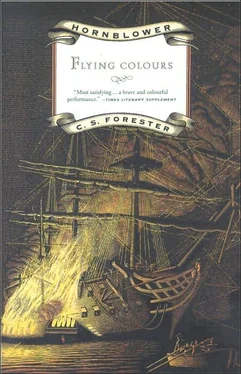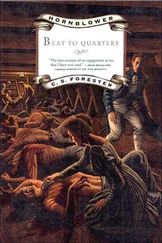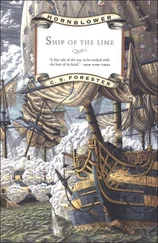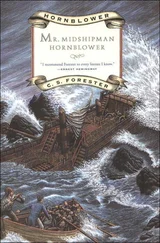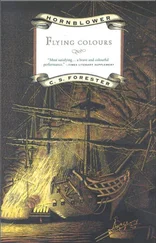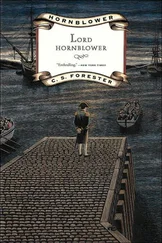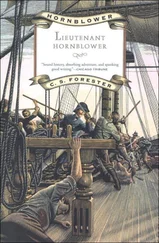Cecil Forester - Flying Colours
Здесь есть возможность читать онлайн «Cecil Forester - Flying Colours» весь текст электронной книги совершенно бесплатно (целиком полную версию без сокращений). В некоторых случаях можно слушать аудио, скачать через торрент в формате fb2 и присутствует краткое содержание. Год выпуска: 1989, ISBN: 1989, Издательство: Back Bay Books, Жанр: Исторические приключения, Путешествия и география, Морские приключения, на английском языке. Описание произведения, (предисловие) а так же отзывы посетителей доступны на портале библиотеки ЛибКат.
- Название:Flying Colours
- Автор:
- Издательство:Back Bay Books
- Жанр:
- Год:1989
- ISBN:0316289396
- Рейтинг книги:5 / 5. Голосов: 1
-
Избранное:Добавить в избранное
- Отзывы:
-
Ваша оценка:
- 100
- 1
- 2
- 3
- 4
- 5
Flying Colours: краткое содержание, описание и аннотация
Предлагаем к чтению аннотацию, описание, краткое содержание или предисловие (зависит от того, что написал сам автор книги «Flying Colours»). Если вы не нашли необходимую информацию о книге — напишите в комментариях, мы постараемся отыскать её.
Flying Colours — читать онлайн бесплатно полную книгу (весь текст) целиком
Ниже представлен текст книги, разбитый по страницам. Система сохранения места последней прочитанной страницы, позволяет с удобством читать онлайн бесплатно книгу «Flying Colours», без необходимости каждый раз заново искать на чём Вы остановились. Поставьте закладку, и сможете в любой момент перейти на страницу, на которой закончили чтение.
Интервал:
Закладка:
“Rubbish,” said Hornblower. The pathetic gratitude in Bush’s voice and expression made him feel uncomfortable.
“And how is it with you, sir?” asked Bush, regarding him with anxious blue eyes.
Hornblower shrugged his shoulders.
“Fit and well,” he said.
“I was sorry to hear about Mrs Hornblower, sir,” said Bush.
That was all he needed to say on that subject. They knew each other too well to have to enlarge on it.
“I took the liberty, sir,” said Bush, hastily, “of bringing you out your letters—there was a good deal waiting for you.”
“Yes?” said Hornblower.
“This big package is a sword, I’m sure, sir,” said Bush. He was cunning enough to think of ways of capturing Hornblower’s interest.
“Let’s open it, then,” said Hornblower, indulgently.
A sword it was, sure enough, with a gold-mounted scabbard and a gold hilt, and when Hornblower drew it the blue steel blade bore an inscription in gold inlay. It was the sword ‘of one hundred guineas’ value’ which had been presented to him by the Patriotic Fund for his defeat of the Natividad in the Lydia, and which he had left in pawn with Duddingstone the ship’s chandler at Plymouth, as a pledge for payment for captain’s stores when he was commissioning the Sutherland.
“A sight too much writing on this for me,” Duddingstone had complained at the time.
“Let’s see what Duddingstone has to say,” said Hornblower, tearing open the note enclosed in the package.
Sir,
It was with great emotion that I read to-day of your escape from the Corsican’s clutches and I cannot find words to express my relief that the reports of your untimely death were unfounded, nor my admiration of your exploits during your last commission. I cannot reconcile it with my conscience to retain the sword of an officer so distinguished, and have therefore taken the liberty of forwarding the enclosed to you, hoping that in consequence you will wear it when next you enforce Britannia’s dominion of the seas.
Your obedient and humble servant to command.
J. DUDDINGSTONE.“God bless my soul!” said Hornblower.
He let Bush read the note; Bush was a captain and his equal now, as well as his friend, and there was no disciplinary objection to allowing him to know to what shifts he had been put when commissioning the Sutherland. Hornblower laughed a little self-consciously when Bush looked up at him after reading the note.
“Our friend Duddingstone,” said Hornblower, “must have been very moved to allow a pledge for forty guineas to slip out of his fingers.” He spoke cynically to keep the pride out of his voice, but he was genuinely moved. His eyes would have grown moist if he had allowed them.
“I’m not surprised, sir,” said Bush, fumbling among the newspapers beside him. “Look at this, sir, and at this. Here’s the Morning Chronicle, and The Times. I saved them to show you, hoping you’d be interested.”
Hornblower glanced at the columns indicated; somehow the gist of them seemed to leap out at him without his having to read them. The British press had let itself go thoroughly. As even Bush had foreseen, the fancy of the British public had been caught by the news that a captain whom they had imagined to be foully done to death by the Corsican tyrant had succeeded in escaping, and not merely in escaping, but in carrying off a British ship of war which had been for months a prize to the Corsican. There were columns in praise of Hornblower’s daring and ability. A passage in The Times caught Hornblower’s attention and he read it more carefully.
‘Captain Hornblower still has to stand his trial for the loss of the Sutherland, but, as we pointed out in our examination of the news of the battle of Rosas Bay, his conduct was so well advised and his behaviour so exemplary on that occasion, whether he was acting under the orders of the late Admiral Leighton or not, that although the case is still sub judice, we have no hesitation in predicting his speedy reappointment.’
“Here’s what the Anti-Gallican has to say, sir,” said Bush.
What the Anti-Gallican had to say was very like what the other newspapers had said; it was beginning to dawn upon Hornblower that he was famous. He laughed uncomfortably again. All this was a most curious experience and he was not at all sure that he liked it. Cold-bloodedly he could see the reason for it. Lately there had been no naval officer prominent in the affections of the public—Cochrane had wrecked himself by his intemperate wrath after the Basque Roads, while six years had passed since Hardy had kissed the dying Nelson; Collingwood was dead and Leighton too, for that matter—and the public always demanded an idol. Like the Israelites in the desert, they were not satisfied with an invisible object for their devotion. Chance had made him the public’s idol, and presumably Government were not sorry, seeing how much it would strengthen their position to have one of their own men suddenly popular. But somehow he did not like it; he was not used to fame, he distrusted it, and his ever-present personal modesty made him feel it was all a sham.
“I hope you’re pleased, sir,” said Bush, looking wonderingly at the struggle on Hornblower’s face.
“Yes. I suppose I am,” said Hornblower.
“The Navy bought the Witch of Endor yesterday at the Prize Court!” said Bush, searching wildly for news which might delight this odd captain of his. “Four thousand pounds was the price, sir. And the division of the prize money where the prize has been taken by an incomplete crew is governed by an old regulation – I didn’t know about it, sir, until they told me. It was made after that boat’s crew from Squirrel, after she foundered, captured the Spanish plate ship in ‘97. Two thirds to you, sir—that’s two thousand six hundred pounds. And a thousand to me and four hundred for Brown.”
“H’m,” said Hornblower.
Two thousand six hundred pounds was a substantial bit of money—a far more concrete reward than the acclamation of a capricious public.
“And there’s all these letters and packets, sir,” went on Bush, anxious to exploit the propitious moment.
The first dozen letters were all from people unknown to him, writing to congratulate him on his success and escape. Two at least were from madmen, apparently—but on the other hand two were from peers; even Hornblower was a little impressed by the signatures and the coroneted notepaper. Bush was more impressed still when they were passed over to him to read.
“That’s very good indeed, sir, isn’t it?” he said. “There are some more here.”
Hornblower’s hand shot out and picked one letter out of the mass offered him the moment he saw the handwriting, and then when he had taken it he stood for a second holding it in his hand, hesitating before opening. The anxious Bush saw the hardening of his mouth and the waning of the colour in his cheeks; watched him while he read, but Hornblower had regained his self-control and his expression altered no farther.
London,
129 Bond Street.
3rd June 1811
DEAR CAPTAIN HORNBLOWER,
It is hard for me to write this letter, so overwhelmed am I with pleasure and surprise at hearing at this moment from the Admiralty that you are free and well. I hasten to let you know that I have your son here in my care. When he was left orphaned after the lamented death of your wife I ventured to take charge of him and make myself responsible for his upbringing, while my brothers Lords Wellesley and Wellington consented to act as his godfathers at his baptism, whereat he was consequently given the names Richard Arthur Horatio. Richard is a fine healthy boy with a wonderful resemblance to his father and he has already endeared himself greatly to me, to such an extent that I shall be conscious of a great loss when the time comes for you to take him away from me. Let me assure you that I shall look upon it as a pleasure to continue to have charge of Richard until that time, as I can easily guess that you will be much occupied with affairs on your arrival in England. You will be very welcome should you care to call here to see your son, who grows in intelligence every day. It will give pleasure not only to Richard, but to
Читать дальшеИнтервал:
Закладка:
Похожие книги на «Flying Colours»
Представляем Вашему вниманию похожие книги на «Flying Colours» списком для выбора. Мы отобрали схожую по названию и смыслу литературу в надежде предоставить читателям больше вариантов отыскать новые, интересные, ещё непрочитанные произведения.
Обсуждение, отзывы о книге «Flying Colours» и просто собственные мнения читателей. Оставьте ваши комментарии, напишите, что Вы думаете о произведении, его смысле или главных героях. Укажите что конкретно понравилось, а что нет, и почему Вы так считаете.
